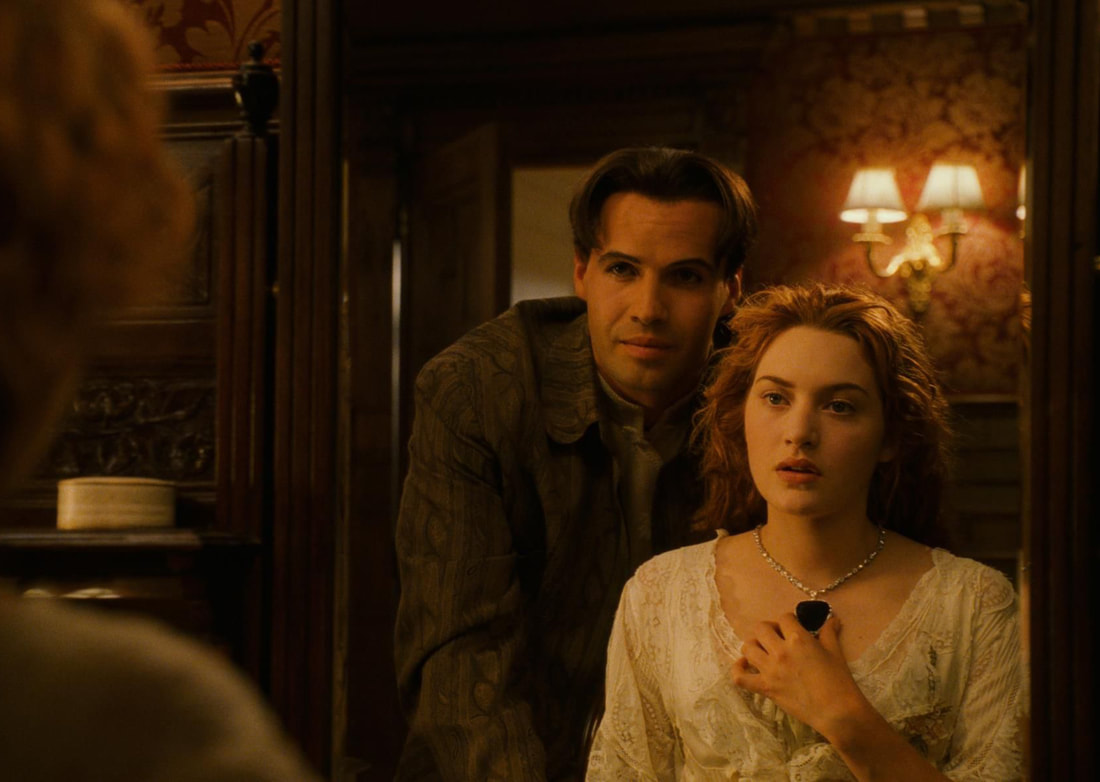ARTICLE / SHORT READCUT TO [greed]
|
BY Hannah Lake
|
James Cameron’s 1997 film TITANIC presents the story of the maiden voyage of the luxurious and magnificent liner fondly known as “the ship of dreams”. The film depicts two very clear and irreconcilable classes, but what and whose dream did a ticket fulfil and how did that dream differ for those in third and first class? Greed ultimately leads to the death of Cal Hockley (Billy Zane), Rose’s (Kate Winslet) rich suitor, and causes her mother Ruth Dewitt Bukater (Frances Fisher) to lose her daughter.
From Rose’s car, luggage, hair, make-up and posh frock, to Jack’s (Leonardo DiCaprio) off-white shirt, very few belongings, and a ticket won in a lucky hand of poker, the divide between rich and poor is clear from the outset. Having saved Rose’s life, Jack is invited to dine with those in first class before which Molly Brown (Kathy Bates) advises: “remember, they love money. So pretend like you own a gold mine and you’re in the club”. Greed is the key to happiness here, not honesty, intellect, kindness or love. If you have money, you are “in”, regardless of what you do with it or where it came from. Speaking of Cal, Old Rose (Gloria Stuart) remarks “That's the last time I ever saw him. He married, of course. And inherited his millions. But the crash of '29 hit his interests hard, and he put a pistol in his mouth that year. Or so I read”. Cal’s need to be rich overwhelmed everything else so when the money was gone he felt no other option than to kill himself. Some viewers at the time argued that Cal did indeed love Rose and potentially it was her rejection that began the path that lead to his suicide. His money did not please Rose, which meant her mother was unhappy and, in the end so was Cal. In this case money really did not buy any of them happiness, in fact, Jack and Rose’s core narrative suggested that travelling, love and questioning the hierarchy was what led to fulfilment and that greed would only end with sadness and even death. Class divisions seem far more complex and variable today, ranging from the precariat to Beyoncé. Determining this provides a way to work out what your chances of survival would have been, as statistics show that had you been in third class, your chances would have been slimmer than had you been in first class. According to British Parliamentary Papers: Shipping Casualties (Loss of the Steamship “Titanic”) 1912, 97.22% of female passengers in first class were saved compared to 46.06% in third, 32.57% of male passengers in first class were saved compared with 16.23% in third and 100% of children in first class were saved compared to 34.18% in third. The film portrays a scenario in which this was done intentionally by closing the gates, trapping the lower classes in while the first class were lowered into the Atlantic in half-filled boats. Whether there is any proof to this theory is still under discussion. Ruth asks, “Will these lifeboats be seated according to class? I hope they’re not too crowded”. Rose responds: “Half the people on this ship are going to die” and just when you’re considering feeling sorry for Cal for losing Rose to Jack, he ruins it with: “Not the better half”. It is the perfect example of how greed ultimately defines Cal and highlights the juxtaposition of wealth and poverty that TITANIC creates. more GREED >>> |


